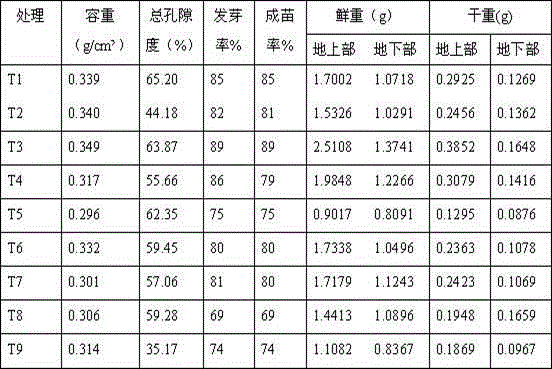Special matrix for watermelon seedling culture
A seedling raising substrate and substrate technology, applied in the direction of application, fertilizer mixture, alkaline orthophosphate fertilizer, etc., to achieve the effect of reducing pH, reducing environmental pollution, and less use
- Summary
- Abstract
- Description
- Claims
- Application Information
AI Technical Summary
Problems solved by technology
Method used
Image
Examples
Embodiment 1
[0024] A special substrate for raising watermelon seedlings. The main raw materials of the substrate are organic wastes such as vinegar residue and cassava residue, and the volume ratio of vinegar residue and cassava residue is 1:1.5.
[0025] The raw materials are fermented and decomposed with a self-made high-temperature quick-rot agent for organic materials composed of actinomycetes, yeast, lactic acid bacteria, and bacillus. The bacteria content of the quick-rot agent is 150 million units / g, of which actinomycetes account for 60% About; the dosage of quick-rot agent is 25kg of quick-rot agent for every 150m3 raw material. The fermentation time is about 40 days. After the fermented organic mixture is dried and crushed, vermiculite, peat, perlite, plant ash and other auxiliary materials are added. The preferred volume ratio of the matrix formula is: organic mixture 43%, peat 7%, perlite 8%, vermiculite 17%, plant ash 25%; the raw and auxiliary materials are fully stirred eve...
Embodiment 2
[0027] A special substrate for raising watermelon seedlings is characterized in that the substrate includes organic mixture, peat, perlite, vermiculite, plant ash and a small amount of inorganic fertilizer.
[0028] The organic mixture is a mixture of vinegar residue, cassava residue and other organic wastes that have been fermented and decomposed, and the volume ratio of vinegar residue and cassava residue is 1:1; the inorganic fertilizer includes ammonium sulfur nitrate, potassium chloride, phosphoric acid- Ammonium.
[0029] The formula volume ratio of the seedling-raising matrix is: organic mixture 35%, peat 15%, perlite 5%, vermiculite 25%, plant ash 20%; the described seedling-raising matrix also contains ammonium sulfur nitrate 0.6kg / m 3 , potassium chloride 0.3 kg / m 3 , monoammonium phosphate 0.3 kg / m 3 .
[0030] The organic mixture is the decomposed material of vinegar residue and cassava residue mixture through fermentation treatment; the fermentation treatment i...
Embodiment 3
[0033] A special substrate for raising watermelon seedlings is characterized in that the substrate includes organic mixture, peat, perlite, vermiculite, plant ash and a small amount of inorganic fertilizer.
[0034] The organic mixture is a mixture of vinegar residue, cassava residue and other organic wastes that have been fermented and decomposed, and the volume ratio of vinegar residue and cassava residue is 1:2; the inorganic fertilizer includes ammonium sulfur nitrate, potassium chloride, phosphoric acid- Ammonium.
[0035] The formula volume ratio of the seedling-raising matrix is: 50% of organic mixture, 5% of peat, 15% of perlite, 15% of vermiculite, and 15% of plant ash; 3 , potassium chloride 0.3 kg / m 3 , monoammonium phosphate 0.3 kg / m 3 .
[0036]The organic mixture is the decomposed material of vinegar residue and cassava residue mixture through fermentation treatment; the fermentation treatment is to use a high-temperature quick-rot agent to stack and decompose...
PUM
| Property | Measurement | Unit |
|---|---|---|
| Density | aaaaa | aaaaa |
| Density | aaaaa | aaaaa |
| Ec value | aaaaa | aaaaa |
Abstract
Description
Claims
Application Information
 Login to View More
Login to View More - R&D
- Intellectual Property
- Life Sciences
- Materials
- Tech Scout
- Unparalleled Data Quality
- Higher Quality Content
- 60% Fewer Hallucinations
Browse by: Latest US Patents, China's latest patents, Technical Efficacy Thesaurus, Application Domain, Technology Topic, Popular Technical Reports.
© 2025 PatSnap. All rights reserved.Legal|Privacy policy|Modern Slavery Act Transparency Statement|Sitemap|About US| Contact US: help@patsnap.com

